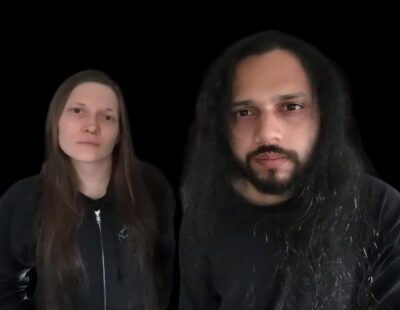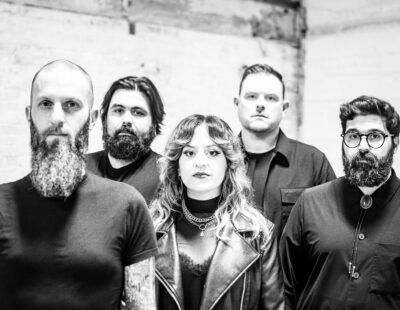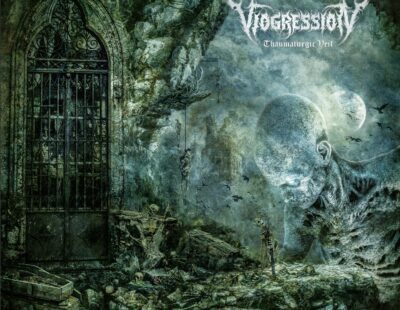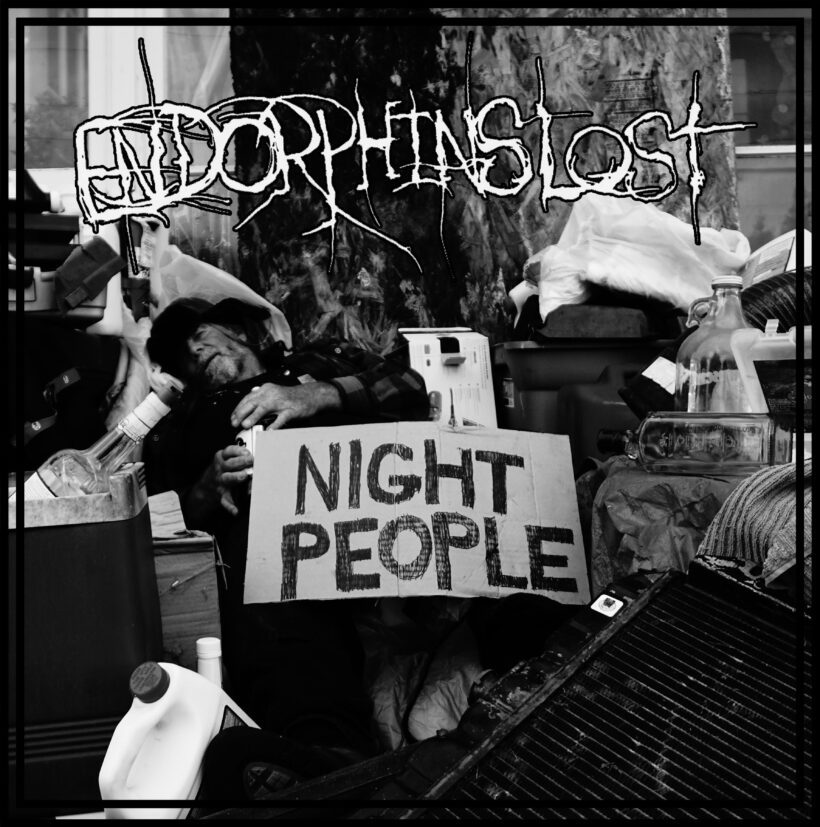
Hardcore and powerviolence are genres of music that react to the world around them. Even more so than some other genres of music, they often reflect the politics and environments that surround them, from Capitalist Casualties and Minor Threat to Soul Glo and Endorphins Lost. The Seattle-based collective have been ripping through the underground for nearly 15 years, their songs and lyrics reflecting the quality of mental health treatment and way average people have been forgotten in the United States.
Endorphins Lost have only doubled down on that on Night People, tearing through 14 tracks that pull few punches and offer little quarter to the inequalities of modern life. Night People is a straightforward record, bridging stomping hardcore with stop-start powerviolence, an album that would fit on the shelf next to your favorite Spazz record.
In addition to a full stream of Night People ahead of its release on Friday (February 3) via To Live a Lie and Rotten to the Core Records, Decibel spoke with Endorphins Lost bassist Brandon Hayden for a deeper look at the album.
You released your last album, Head Sick, in August of 2022, less than six months ago. Has anything changed in the band since that album was recorded or released?
No, that was more of a logistical situation. The pandemic disrupted the timeline of both of our releases so much that they sort of bottlenecked and unintentionally released very close to one another. Both releases were recorded within the same session.
We often will write and record in this fashion so that way we have something to tide everyone over while we are recording for the next album. Sort of a ‘here is an EP as an appetizer while you wait for the main course’ type of thing, but unfortunately that didn’t roll out as planned. So instead you get a whole mass of new tunes at once!
Lyrically, Endorphins Lost has always written about subjects like the treatment of mental health in the United States and the way of life for those who aren’t in the upper class. Did you have specific ideas in mind on Night People or was it a general expression of frustration and anger?
There were more specific ideas in mind and the title is very apt to the content. I have always written lyrics from my personal perspective and within the orbit of things I have experienced in my life. Along with historical events that somehow tie into a contemporary narrative.
The main focus here is the stress that haunts people to the point of madness; to the point of going to radical extremes to ease the pressure. It’s no secret to the people who know us that my wife and I have suffered tremendous losses in our attempts to have a child, ultimately ending in the brief life and death of our daughter, Fern Louise, in 2021. So a lot of the lyrics are about our own personal issues that haunt us to the point of no sleep and our experiences within the modern western medical practice.
The theme of being haunted by trauma extends to expose the duality of the deeds done when, allegorically speaking, the rest of the world sleeps. Those who conspire and indulge in the dead of the night are by and large up to no good. Hatching plans from a point of power, or at least a modicum of reckless leverage, that the rest of society will have to suffer for. The other side of the coin is the people at the bottom, haunted by what faces them come morning.
These songs were inspired hugely by the idea of the ‘Forgotten Man.’ No one gives a fuck about him. Lost to time and to financial encumbrance. To society, this person is just some more trash to be swept away come morning. Their problems, hopes and aspirations are null and void to the rest of society and are easily cast aside. I truly think that is how a large portion of people view the growing social problems in this country specifically. As if they are thinking, “If there were just a big enough trash can to fit all the rubbish people.” It’s a sad truth that nothing is getting better.
I think that this is a timeless concept but it is something more in our face now than maybe any other time in our lifetime. (at least in America).
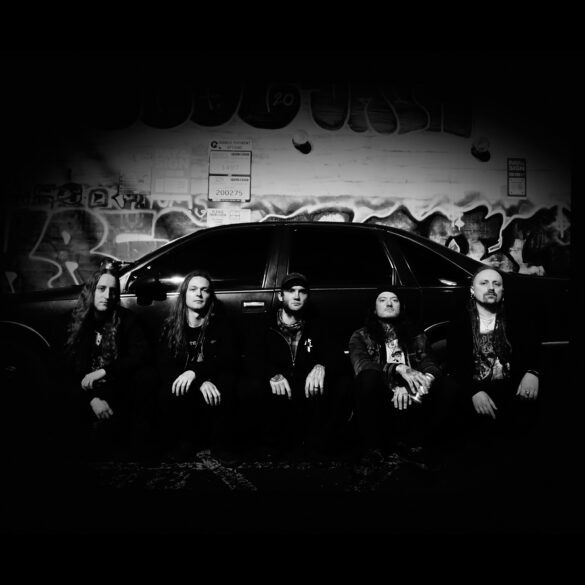
The band is based in the Pacific Northwest (Seattle?), where some major cities are really struggling (or barely trying, in some cases) to manage their homelessness and mental health crises. Though this is an issue in every major city, do you feel like this influenced your writing?
The band is based in Seattle proper, though we have one member (me) living out of state in Arizona. This is something we have always written about and that is kind of a double-edged sword for us optically, now that the homeless and mental health crisis is seething out of control in this country, to the point where it can no longer be ignored by those who are privileged to just not think about it. Unless you have been paying attention to our message all along, it looks like we are jumping on a trend and exploiting this situation for our creative needs. I hope that this is just a paranoia of mine because I personally am not a fan of topical “in” subjects to write about.
Writing about the current event of the week seems trite and a little bit false to me. Of course there is room to be influenced by contemporary topics, but it really depends on how the art reflects these issues. This is something we base the entire band’s stance and ethos on and now that it is in the public eye almost constantly, I hope people see that we too have always been harsh critics of how homelessness and mental health issues are handled. As a band, we want to live within a space of consistency and timeless urgency. Our musical style may ebb and flow some and may fall out of vogue with the masses at times, but the content has always been the same, and likely always will.
What was the recording process like? Was this an album that happened pretty naturally or was it a struggle to make?
This was the first album where pre-production, writing and rehearsal to prepare for the session was done without all of us in the same room at one given time. The pandemic for obvious reasons made a massive hurdle to overcome for everyone, especially with me living out of state and being essentially grounded by travel restrictions. I started writing these songs in 2019 and for the next year I would regularly have Skype sessions with our guitarist Sam teaching him riffs.
Brian and Sam are absolutely the reason that this album even came out in the time that it did! They were so precise and thorough when learning the riffs. So Sam would then take the songs to Brian show him the stuff and we would just work our way through the tunes with videos of the jams when the other members could safely attend practice. All the while, I would be making pre-production demos. When travel restrictions eased up a little and it seemed the risk of infection was waning, Brian and Chris (drums and guitar) flew to me in AZ where I have a home studio. We tracked drums, bass and Chris’ guitars, which he learned a huge portion of in the studio! Then, over the next months, Sam and Kerry recorded their guitars and vocal parts respectively from home. So, convoluted? Very much! Difficult? Not really, thanks to the band’s commitment to keep going. I am lucky and grateful to do this band with such astute and dedicated players.
Night People is your first release where the specter of COVID is less prevalent since it first appeared, compared to Demo 2020 and Head Sick. Do you feel any different than you did for those releases?
I think, if anything, we are just grateful that people like the music we make and continue to make music in the wake of such a global disruption of all facets of life. I feel like it has launched us on a path to learning more and planning more just to make things happen, which is never a bad thing! I engineered the Demo 2020 which ultimately was 6 of 20 songs from the Head Sick/Night People session. Knowing at the time that it was a demo for the two releases to come, I felt fine with releasing it under the pretense of “Covid-era demo” It wasn’t until the full lockdown when all the studios, including our preferred studio—Earhammer in Oakland, CA, where we recorded the two previous LPs,—shut down that I decided to fully embrace my attempt at engineering the actual LP. I didn’t have the confidence to do it until it was established that if we wanted to move forward with recording, there was no other way to approach it than doing it ourselves.
Endorphins Lost has been a band for nearly 15 year now. How has your approach to writing and performing music changed in that time?
Not really. Logistically things have changed just so that we can still write and perform with me living out of state. But that has been the way things have been since 2015 when I moved to Arizona. It really isn’t that difficult because the guys in the band are all on the same page with what we are trying to achieve sonically and the talent is there to pull off whatever the song needs to be. I still write a bunch of thoughts/fears/complaints down and then I write riffs to complement the sentiment of the words. I bring it to the band and we turn it into music palatable among the ilk.
Our band dynamic just requires a lot of practicing and forward thinking, on our own and as a group, as much as that is possible. I can’t express enough how crucial the guys in the band now are to its existence. There are not many people who will go along with a long distance relationship like this, let alone pull it off night after night when we do get to do live gigs.





